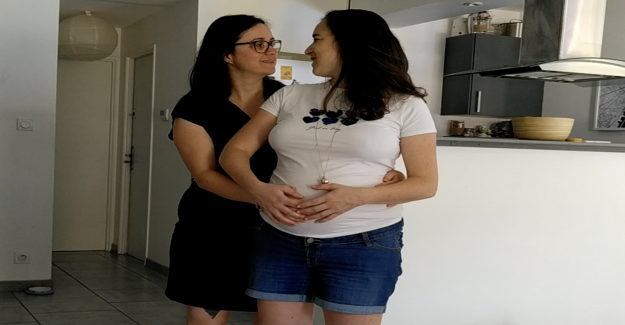Each year thousands of French women cross the border to Spain to realize their maternity dreams. "Reproductive tourism", they say, in a pejorative sense; The possibility, simply, to achieve happiness, for others. This pyrenee phenomenon is driven by legal and technological reasons.
The most recent report of Sanididy of the Spanish Society of Fertility (SEF) indicates that 3,500 French resorted to Spanish clinics in 2018 to undergo assisted reproduction treatments. The data from Laclinica IVI (Valencian Institute of Infertility), a reference center in the field of fertility in Spain, reveal that women in France represent approximately 20% of their patients.
According to the figures of LASEF, the Spanish clinics specialized in fertility have passed from 190 16 years ago at 307 in 2016. A business that enjoys prosperity thanks to that it is increasing more French women, moved by the speed of treatments, a Very high success rate, the use of the most advanced techniques and a French-speaking medical staff to respond to this strong demand.
All this is possible thanks to the Spanish legislative framework, one of the most permissives in Europe, collected in Laley of assisted human reproduction, approved in 2006, on techniques of assisted human reproduction.
Treatments for women alone, the anonymous donation of sperm and ovules, post-mortem fertilization, preimplantation diagnosis or embryo adoption are legal in Spain and not in other European countries such as France.
The differences with the neighboring country are still remarkable despite approval, on June 29, of a bill to open the reproduction assisted by single women to lesbian couples.
The Slogan PMA Pour Toutes! (Assisted reproduction for all) will enter into force in the coming months after a year and a half years of frantic demonstrations and debates at the National Assembly. It is a small revolution for a whole branch of the population that can now benefit from adequate treatments in French soil and social coverage.
Could this legislative change end the flow of French women to Spanish clinics? Virginie Rio, president of the collective Bamp, who defends the interests of people with fertility problems, criticizes the project for being a "political visualization law" and considers that it still falls short "if we compare it with neighboring European countries, about Everywhere Spain ".
In his opinion, one of the most worrisome points is that in France, with 67 million inhabitants, treatments can only be offered in 29 centers (CECO), all of them integrated into public health. The window opened by the new law will promote more requests and an increase in waiting lists.
"Sometimes you can wait up to six months to have an appointment in a center," says Virginie. As a comparison, in Spain, clinics have a waiting period of between three and nine months between the request and the transfer of embryos.
"I did not want France to give me green light to be a mother," says Emilie, who at 37 years has started an assisted reproduction treatment at the Euginen Barcelona Clinic. She approaches 40 years and wants to take advantage of her financial stability and her from her to be a mother without waiting for French law. "When it was approved, I did not have doubts. To be honest, I never occurred to me to do this type of process in France," explains Emilie.
Another claim of the Spanish clinics are technical as the clothing method, prohibited in France. This technique allows the use of the oocytes of the second mother who does not carry the child. Marion, 35, lives in Lyon. She is pregnant and will give birth to two twins in the coming months. She and her wife chose Spain for geographical proximity and for its high success rate, but also by the progressive vision of the law in several techniques.
"The clothing method is perceived as a subrogated gestation, although in Spain we can use the oocytes of the two mothers, and also be pregnant together if we want. That allows to optimize our opportunities to conceive," trust Marion. Spain looks like the country that corresponds to the expectations of the couple: "Our babies are Made in Spain" and we do not regret this election at any time, "says Marion.
There are many french women alone, in heterosexual or lesbian couple who travel to Spain to found a family without waiting for the new law in France. The biological clock is decisive when choosing. Léna, 49, a mother, mother of a child and two twins, tells her experience and provides a possible answer to this dilemma.
With his wife he made the process in Spain when he was 38 years old. Léna is clear: "My recommendation a posteriori would be to think in terms of age, if we approach the quarantine, it is better to look at Spain to avoid too long delays. If you are a 25-year-old woman, you can afford to wait To make things fit in France and having assisted reproduction near home. "
In addition, the vitrification of the ovules that opens without medical reason in France has a 42-year-old age, against Spain that has a more permissive law. "If I want to make another IVF, I would have to do it in Spain in view of my age," trusts Léna.
The logistic part -Viating, transport, accommodation - generates a supplementary stress. The three women confess a feeling of injustice during key moments as entry into the operating room. With the new law, French people feel divided by undertaking maternity in French soil because it is more comfortable or in Spain for its tactical advantages.
One aspect that can tilt the balance of one side or the other is the anonymity of the donors. By virtue of the new law, in France, children conceived thanks to the donation of ovules or semen will be able to know the identity of their parents when they reach 18 years. In Spain, no changes are expected to the Law of 2006, although the Bioethics' last year was recommended to grab anonymity in favor of the right of children to know their origin.
This requirement would discourage women like Emilie, for whom Spain offers the framework you want to be a solo mother. Another effect of ending anonymity would be the drastic fall of donations already observed in other countries, as director of the IVI Medical Group points out, Dr. Antonio Requena. "This change of law to give access to identity could train a penury in donation banks."
Far from curbing the interest for Spanish clinics, French law continues to question the new requests for assisted reproduction and motivates the most accommodated to travel to Spain. In view of the restrictions surrounding this expansion of law, the process seems almost an obstacle course for the last arrivals to the waiting lists of the Galo country.
The Spanish legislation presents advantages and its recognition is well established. According to Antonio Requena, Spain has a privileged relationship with French women, and can continue to contribute to their expectations. "We are in a phase of change and we will see its effects in the years that follow, but France needs time to organize".
Date Of Update: 25 July 2021, 20:23











